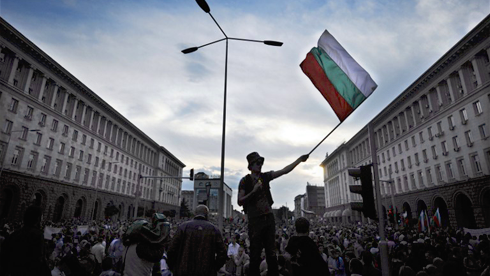I wrote an article some time ago to explain how I found a person who reads to be beautiful. That person, you see, is discreetly cultivating his taste for things that are absent. And a person who has this cultivated taste cannot be a swine.
The person who protests is beautiful too, and for the same reasons. Today, the two are tied, intimately but strongly. When the person who reads goes out into the street to protest, we notice him immediately. And his protest becomes more luminous, full of sense. This is what we are seeing today in the streets of Sofia and elsewhere. Both literally and metaphorically, these protests are the protests of children. Of the children and the grandchildren of those who came out in February to protest against the hike in the price of electricity.
But June is not February. The children of June are demanding much more. Today, it is no longer a question of money and unpaid bills. In February, the political elite responded very quickly, and the Conservative government of Boyko Borisov resigned after two weeks of demonstrations that were at times marred by violence. When it comes to money, things are simpler: one launches some pie-in-the-sky promises, hands out state aid and blames everything on big foreign capital that controls the electricity companies.
Protest sparked by Delyan Peevski
Today is quite another matter. And it’s total confusion. The protesters say they do not want a shady oligarchy to go on leading the country. The elites fail to grasp that, because they eat straight out of the hands of this shady oligarchy. For them, politics boils down to the behind-the-scenes intrigues that this oligarchy cooks up. Moreover, today we are no longer hearing from the political-scientist flunkeys who are happy to trot out, in their pleased way, their insights into the situation – those who, on television in February, were puttings words into the mouth of the protesters. That was how poor people who could not pay their bills, the humiliated and despised, were made to repeat absurdities like “the Icelandic model”, the “Irish model”, “nationalisation”, and so on.
Today, the ones who are coming out into the streets every day after 6:30 pm all have jobs, and they pay their electricity and heating bills. There are a lot of them, and from very different walks of life: parents, teachers, journalists, writers, bicyclists, actors, engineers, students, readers.These aren't professional revolutionaries, much less hooligans. That they all feel deeply offended is enough to make them come out into the street.
The most amazing thing is that the current political elite does not always grasp why all these people are out there. The spark was the appointment of controversial MP, Delyan Peevski [which has now been revoked by parliament], as head of the National Security Agency (DANS, counter-intelligence). “We underestimated the public image of this man”, said Prime Minister Plamen Oresharski (a “non-partisan” Socialist Party member whose coalition government is supported by the ethnic Turkish party, the MDL, and the ultra-nationalists of Ataka) [On June 19, the Parliament canceled the appointment of Mr. Peevski].
“We underestimated the resistance that his appointment has generated,” added the Chair of the Socialist Party, Sergei Stanishev. For them, the problem is not the candidate himself but his apparently maligned image. Welcome to the language of the shady oligarchy. “We underestimated the scale of the challenge. We were expecting a hundred people to show up outside Parliament, and it turned into quite another thing.”
Protests must not be hijacked
If financiers read books, our crises would be different. At the very least, the financiers might develop some sensitivity. But books, and sensitivity, are not part of their portfolios. Like its predecessor, this government has yet to grasp that the economic crisis is only the tip of the iceberg of another crisis, a much deeper and more personal crisis: a crisis of meaning, of hope for the future.
It’s good to have experts, for sure, but expertise should always come after morality. And the economy after ethics. An expert without morality will always only be a tool in the hands of those who have bought his services, a tool in the service of any oligarchy.
The first days of protest are the most beautiful, the most unexpected. We must be on our guard to save these protests from being hijacked, manipulated and distorted by nationalists and troublemakers. I sincerely hope that this protest will find the force to remain as it is today. With parents who come with their children perched on their shoulders, with smiling faces and a quiet anger. With this sense of belonging, finally, to a community of values. Because the person who protests is truly beautiful. And sensible.
Was this article useful? If so we are delighted!
It is freely available because we believe that the right to free and independent information is essential for democracy. But this right is not guaranteed forever, and independence comes at a cost. We need your support in order to continue publishing independent, multilingual news for all Europeans.
Discover our subscription offers and their exclusive benefits and become a member of our community now!












